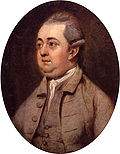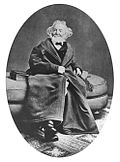Historian

A historian is someone who studies history.[1] Historians use written sources to understand past events and societies.
Education
Professional historians often get a Master's degree or PhD. A Master's degree student spends most of their time in the classroom. A PhD student needs to write a long research paper known as a thesis to graduate.[2] Classes focus on learning about history, not teaching history. However, most historians do need to teach history.[2]
As a job
Professional historians are often professors of history and teach it at colleges and universities. They share their ideas about history by writing books and articles.
Other historians work in public history. They may work in museums or at landmarks where important historic events happened.
Historian Media
Herodotus (c. 484 – c. 425 BC) was a Greek historian who lived in the fifth century BC and one of the earliest historians whose work survives.
Reproduction of part of a tenth-century copy of Thucydides's History of the Peloponnesian War.
Leonardo Bruni (c. 1370–1444), the historian who first divided history into the three eras of Antiquity, the Middle Ages, and Modern times.
A page of Bede's Ecclesiastical History of the English People
Edward Gibbon's Decline of the Roman Empire (1776) was a masterpiece of late 18th-century history writing.
Ranke established history as a professional academic discipline in Germany.
The 20th century saw the creation of a huge variety of historiographical approaches. Marc Bloch's focus on social history rather than traditional political history was of tremendous influence.
Peter R.L Brown, a Princeton historian of late antiquity and the medieval period.
Related pages
References
| Wikimedia Commons has media related to Lua error in Module:Commons_link at line 62: attempt to index field 'wikibase' (a nil value).. |
Sources
- Richard B. Todd, ed. (2004). Dictionary of British Classicists, 1500–1960, Bristol: Thoemmes Continuum, 2004 ISBN 1-85506-997-0.
- Kelly Boyd, ed. (1999). Encyclopedia of Historians and Historical Writing. London [etc.] : Fitzroy Dearborn ISBN 1-884964-33-8
- Lateiner, D. (1989). The historical method of Herodotus. Phoenix, 23. Toronto: University of Toronto Press.
- John Cannon et al., eds. (1988). The Blackwell Dictionary of Historians. Oxford: Blackwell Publishers, 1988 ISBN 0-631-14708-X.
- Hartog, F. (1988). The mirror of Herodotus: the representation of the other in the writing of history. Berkeley: University of California Press.
- Erik Christiansen (1970). The Last Hundred Years of the Roman Republic, Odense: Andelsbogtrykkeriet
- Gottschalk, L. R. (1950). Understanding history; a primer of historical method. New York: Knopf
- Barnes, M. S. (1896). Studies in historical method. Heath's pedagogical library. Boston: D.C. Heath & Co.
- Taylor, I. (1889). History of the transmission of ancient books to modern times, together with the process of historical proof: or, a concise account of the means by which the genuineness of ancient literature generally, and authenticity of historical works especially, are ascertained, including incidental remarks upon the relative strength of the evidence usually adduced in behalf of the Holy Scriptures. Liverpool: E. Howell.
- Herodotus, Rawlinson, G., Rawlinson, H. C., & Wilkinson, J. G. (1862). History of Herodotus. A new English version. London: John Murray.
- Véricour, L. R. d. (1850). Historical analysis of Christian civilisation. London: J. Chapman.
- Taylor, I. (1828). The process of historical proof. London: Printed for B. J. Holdsworth.
- Elizabeth Kostova "The Historian"








